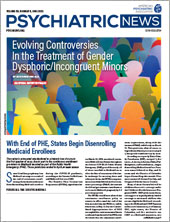The reasons for terminating a psychiatrist-patient relationship are multiple and vary from simple mutually agreeable reasons to more complicated and sometimes contentious ones. In all situations, psychiatrists are racked with concerns of potential patient abandonment, which is unethical and can lead to malpractice issues. Questions such as the number of referral options to offer the patient, quantity of medications to prescribe during the transition period, and the number of refills to safely prescribe without a follow-up appointment are all challenges. These questions are further compounded by the dearth of psychiatrists who are accepting new patients or who accept insurance and whether the patient has insurance and, if so, what kind.
Specifically, termination of treatment must be conducted thoughtfully and in a manner that minimizes risk to the patient. This is even more so when treatment is at an impasse or the therapeutic alliance has been so frayed, perhaps due to the patient’s severe characterological challenges, that the temptation to drop the patient immediately is high. A similar problematic situation occurs when an outpatient psychiatrist suddenly cuts communication with the patient once the patient is admitted to a psychiatric hospital and subsequently refuses to take the patient back upon discharge without adequate transfer of follow-up care. The outpatient psychiatrist would have a tough time excusing his or her behavior if an abandoned patient presented a serious risk to the community.
When terminating a patient, psychiatrists should determine a plan for the patient’s transfer to another provider and calmly discuss and document the plan with the patient and the rationale for termination. The patient should be given at least three referral options, including a local mental health agency likely to have openings, as well as contact information for a crisis center or a mobile crisis team. The same information should be sent via certified mail to the patient, especially if a face-to-face meeting is problematic. If all the recommended referrals are unsuccessful, the patient should be encouraged to contact the psychiatrist as soon as possible, preferably within one month. Referral to a local public or private mental health agency, facilitated by a phone call from the psychiatrist, may faciliate a transfer.
Patients deemed to present little or no risk of danger to themselves or others retain the autonomy to not follow through with recommended referrals and may elect to not do so. In such situations, the psychiatrist may send a certified letter to the patient formally terminating treatment. However, the psychiatrist should be alert to situations that warrant emergency treatment and proceed accordingly. For patients who are in need of careful follow-up care but refuse to contact the recommended referrals, the psychiatrist may seek guidance from the national or local ethics committee or his or her malpractice carrier.
Terminating treatment with a patient can be challenging under regular circumstances. However, the expiration of the COVID-19 Public Health Emergency (PHE) flexibilities has created new challenges for psychiatrists. The emergency measures encouraged the treatment of patients across the country using telepsychiatry by suspending state-mandated licensure requirements. Now that the
PHE has expired, psychiatrists can no longer treat patients outside of jurisdictions where they are licensed to practice, leaving them with the onerous task of referring their patients to local treatment options.
Psychiatrists may seek referral options from their APA district branch or the state/county department of mental health and addiction services covering the region where their patients reside. Stable patients may be referred to the patients’ primary care physician (PCP) for continuation of care, but many patients do not have a PCP or a PCP willing to treat psychiatric patients. If the transfer process drags on for months, psychiatrists should seek a second opinion from a trusted colleague (preferably senior), the local or national Ethics Committee, or his or her malpractice carrier. Indeed, it would be understandable and even recommended to not abandon a patient until treatment has been transferred appropriately. However, the psychiatrist should keep contemporaneous documentation of attempts at transferring care, as well as the rationale for continuing to provide treatment in the interim. Patients’ safety remains our ethical mandate during termination of a treatment relationship regardless of the basis for termination. ■

